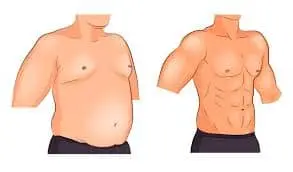Why Losing Weight is So Hard?
Weight-loss commercials promote the simplicity of losing weight: Take this medication, adhere to that diet, or purchase this piece of equipment. Millions of people are still overweight despite the billions of dollars spent each year on weight-loss goods and services.
Several factors can make losing weight difficult. Genetics, race and ethnicity, hormones, metabolism, lifestyle, and mental health may all contribute to this. Specific medical problems may also slow down or prevent weight loss.
Why Is Weight Loss So Hard?
Most people find it difficult to lose weight because their bodies are made to store fat for periods when food is limited. Age, race & ethnicity, hormones, food, physical exercise, and heredity are some of the contributing factors.
You are aware that there are no shortcuts if you have trouble losing weight. Burning more calories than you consume is one way to reduce weight. Even if it seems simple, it’s typically not. Making a sincere commitment to your health daily is more important than simply finding time to work out or opting for a salad instead of a burger. Here are some things to think about to start healthily losing weight.
Genetics
Research shows that hereditary variables are frequently involved in weight loss difficulties. Numerous elements of weight control, including appetite, metabolism, and the sensation of fullness after eating, can be influenced by genetics.
It can also be more difficult to lose weight if you have a rare genetic disease like Prader-Willi syndrome, a chromosomal disorder that causes symptoms like an increased appetite and a predisposition to overeat.
Your Mentality
It will be difficult to lose weight permanently if your goal is to appear a certain way or lose weight for health reasons. While losing weight is a good aim, it can be helpful to find another source of motivation.
Losing weight takes time, and you must keep yourself motivated as you go. Finding extra reasons to stay healthy is one approach. Remind yourself of the many advantages of exercise, such as improved moods, more energy, and better sleep, to mention a few.
Whatever happens, whether you are losing weight or not, record all of your workout successes in an activity notebook. Maintaining your commitment to fitness and your self-perception is important. Consider how you can change your perspective and approach exercise differently because nobody likes to perform something they find uncomfortable.
Your Exercise Routine
If you don’t exercise regularly, losing weight is difficult. Dieting can help you lose weight, but eventually, you’ll probably reach a plateau.
You just need to establish a manageable weekly exercise routine; you don’t need to spend hours at the gym. Finding something you enjoy and will stick with over time is more important than killing yourself with workouts.
This involves removing tasks you dislike and creating a program based on your interests, even if it deviates slightly from recommended fitness regimens. You must be prepared to increase your level of physical activity regularly, not just once every week.
Your Diet
For weight loss, you must alter your eating patterns. This includes persistently trying to substitute harmful foods with more nutritious options.
Here are some suggestions to assist:
- Maintaining a food record
- Reading food labels more frequently
- Making meals at home and being aware of appropriate amount proportions
- Making thoughtful food choices as opposed to thoughtless eating
For long-term weight loss, pay attention to what you consume and make smart choices. Healthy eating never ends, but a regimented diet does. To put it another way, if you want to lose weight permanently, you will never stop eating healthily.
It’s not about sacrificing all you hold dear in the end. Indulgent foods are okay, but not every day. It all boils down to being prepared to examine your diet honestly and figure out ways to cut calories, even if you only make one change at a time.
Your Lifestyle
You must be prepared to alter your lifestyle if you wish to lead a healthy one. Being receptive to new approaches does not imply making drastic changes all at once. You could alter the following to live a healthy life:
Break bad habits. Take a walk rather than sit down, get up early to make your food, or fit in a workout during your lunch break. Busy schedules are used as a justification for poor health. Avoid falling into this trap.
Keep an eye on how you use your free time. It could be necessary to establish new guidelines that restrict how much TV you watch or how much time you spend on the web. To incorporate movement, pay attention to how you spend your time and where you feel unbalanced.
Get rid of junk food from your kitchen cupboards. Having something unhealthy in front of you will make things more difficult, regardless of how dedicated you are. Organize your environment to help you achieve your goals rather than hinder them.
Your Environment
There are moments when you have no control over your surroundings. You are surrounded by temptations at work, including vending machines, junk food brought by coworkers, and donuts. What about your house?
This could involve purchasing equipment for at-home workouts, allocating a certain area of your home for your equipment, or using the TV a few times a week to watch an exercise DVD.
Create an atmosphere that promotes making healthy decisions. Sometimes all it takes to remind you of your goals is to go into your kitchen and see a bowl of fresh fruit.
Your Support Systems
Having a support network is beneficial, even though you may want to get healthy on your own. Find friends and family who are willing to engage or assist and who understand what you’re doing to support your weight loss efforts.
Make plans so you can still accomplish your goals and maintain your relationship if your spouse wants to keep eating things that tempt you. Avoid those who don’t support you and surround yourself with those who do. Another great idea for support is a workout partner.
Your Mental Health
Losing weight is difficult if you are overweight for other reasons, such as depression, trauma from the past, or other health problems. Many people turn to food as a source of comfort and a coping mechanism for their feelings. Identifying these behaviors and their causes is essential to raising awareness.
You can learn more about emotional eating and how you could be engaging in it unknowingly by speaking with a counselor. Discover the reasons behind your decisions and face them.
Your Objectives
Setting unachievable goals will eventually lead to failure. If you feel like a failure all the time, it gets difficult to lose weight. Feeling like a failure will demotivate anyone.
It’s understandable why you continually give up if that’s how you lose weight. Setting realistic goals is essential. Individual differences in reasonableness can be attributed to a variety of factors, including metabolism, activity, diet, and heredity.
Setting a long-term objective, such as finishing a marathon or decreasing weight, is preferable. Concentrate on weekly or daily objectives, such as three aerobic exercises. To ensure that you are always successful, choose tasks that you are confident you can do. As long as it’s within reach, you can make it as little as you wish.
Your Lack of Adaptability
You hear a lot about changing your lifestyle, but your everyday decisions are what put you to the test. What would happen if you couldn’t make it to the gym because you had to work late? What if your fitness class is missed due to traffic? A day can be filled with a variety of events that could divert you off your course.
The secret is to be adaptable. Being ready at all times is beneficial. So that you can take a little walk in the park, keep your exercise shoes in the car. Have some food on hand so you can have a snack before working out if you get caught in traffic.
Your inability to accept failure
You won’t always be flawless. You should realize that we cannot control every part of life if you’re a perfectionist.
On good days, you’ll resist that pizza, eat all your fruits and vegetables, and exercise even when you’re exhausted. On bad days, you’ll skip your workout, have an extra piece of cake at your friend’s birthday party, forget to pack your lunch or wake up late.
There will be bad days. The secret is to keep trying, even if you make mistakes. Try to get over your fear of failing and keep in mind that you are not a failure because you make mistakes. You’re just an individual doing their best to make wise choices.
Are there obstacles to weight loss as people get older?
According to a 2018 study, body fat naturally rises during adulthood until the eighth decade of life, at which point it falls. Waist size usually increases as a result of the body redistributing fat to the middle region. Additionally, muscle mass usually gradually decreases.
Because obese older persons are more likely to suffer from heart disease, diabetes, falls, and a lower quality of life, it is critical to control these natural changes. According to research from 2017, older persons’ general function and health can be enhanced by losing weight and being more fit.
According to a 2019 analysis of weight management experiences among older persons, the following obstacles to weight loss were evident:
- Lack of self-control, health and mobility problems, retirement, a lack of professional advice, a decreased concern about weight compared to their younger years, financial difficulties, and social problems, such as greater possibilities to eat out
- Nevertheless, the researchers point out that because of the study population, the results do not accurately represent the opinions of non-white ethnic groups, whose attitudes regarding aging and weight may vary.
Weight loss after 30
We slowly gain weight from an early age until we are around 75 years old, and our body composition alters as we age. Lean muscle mass has decreased, and total adiposity and fat have increased.
People may have additional responsibilities and work commitments after the age of 30, which may make it difficult for them to engage in physical activity. Additionally, if they are anxious or busy, they might eat more processed foods. It may be more difficult to maintain a moderate weight because of these considerations.
Weight loss after 40
People who were assigned female at birth may have trouble losing weight after the age of 40 for other reasons, in addition to the fact that aging causes an increase in body fat and occasionally weight.
The fact that the menopausal transition often starts between the ages of 45 and 55 is one explanation.
According to a 2021 study, there are several factors contributing to the obesity of over 43% of menopausal women. It explains why lean muscle mass decreases and fat mass increases after menopause. Furthermore, it has been demonstrated that drugs like hormone replacement and antidepressants that doctors prescribe to treat the physical and physiological changes associated with menopause contribute to weight gain.
20% of women gain at least 10 pounds during menopause, according to the analysis. Hormonal changes could be the cause, although aging and a decline in energy expenditure also seem to be factors.
Weight loss after 60
A person who is less physically active after the age of 60 may find it more difficult to lose weight. A person might, for instance, have retired from their job or suffer from medical conditions that restrict their activity or capacity for exercise.
Furthermore, compared to younger adults, elderly persons typically have lower caloric needs but comparable or even higher nutritional needs. In order to control their weight as they get older, people might need to change the way they eat.
How does losing weight happen?
The essential element for weight loss is an energy deficit. When a person burns more calories than they take in, they are said to have an energy deficit.
According to a 2021 review, the “calories-in, calories-out” weight control strategy has emphasized increasing physical activity and decreasing food intake. However according to the review, energy intake and expenditure are dynamic metabolic processes, and the body may adjust in ways that make weight loss difficult.
Furthermore, according to a 2018 assessment, traditional low-calorie diets advise a daily calorie deficit of 500–750 by capping daily caloric intake at 1,200–1,500 for females and 1,500–1,800 for those assigned male at birth.
Different diets for weight loss may utilize meal replacements or restrict fats or carbohydrates. Although some sources claim that a diet’s macronutrient composition matters, the study notes that longer-term research has not yet confirmed this.
According to the analysis, there is no one-size-fits-all method for losing weight, but the best eating plan is one that a person can stick to over time to prevent gaining back the weight they may have lost. An eating plan should also be safe, reasonably priced, and nutritionally sufficient.
For additional information on balanced and healthful eating regimens, a person can consult a nutritionist or other healthcare provider.
The weight loss plateau: what is it?
According to experts, when people begin a weight reduction program, they may lose more weight at first, but as their bodies adjust, they usually hit a weight loss plateau. A person’s weight loss may appear to plateau at this point.
The body may have a set point at which it stabilizes, and metabolic processes may result in a decrease in energy expenditure and an increase in hunger. A plateau in weight loss may also be a crucial time for the body to heal.
The body may be readjusting its metabolic rate or hormone levels at this time. It may also indicate that the body requires more time to build or restore any lean muscle mass that has been lost.
To determine the best strategy for breaking through a weight loss plateau, a person can consult with a healthcare provider.
How to proceed if losing weight is challenging
A 2021 review suggests that the following methods could aid in weight loss:
- Reducing daily calorie consumption
- increasing fruit and vegetable consumption
- converting to monounsaturated and polyunsaturated fats, which are good
- consuming more lean protein
- consuming a nutritious breakfast
- Avoiding eating late at night
- adopting intermittent fasting or time-restricted eating
A person might consult a nutritionist or other medical expert for guidance if they believe they need assistance losing weight.
Conclusion
Losing weight is a challenge for many people. Hormones, metabolic variations, lifestyle choices, mental health issues, and physical conditions are some of the most frequent causes of this. Nonetheless, many people can lose weight by engaging in regular exercise and gradually eating fewer calories than they expend.
Get in touch with a healthcare professional if you’re having trouble losing weight. If needed, they can provide alternative therapies and suggest healthy weight loss methods.
FAQs
Why is weight loss so difficult?
For a variety of reasons, including lifestyle and psychological ones, people may struggle to reduce extra weight. Hormonal variables like menopause or changes in a person’s body composition as they age could be additional causes.
Are you making an effort to reduce your weight?
Your body’s biological adaptations, which evolved eons ago during evolution and have since become established in your DNA, are actively undermining your weight loss efforts. It’s not just that you’re not trying hard enough.
What makes people lose weight?
Hormonal variables like menopause or changes in a person’s body composition as they age could be additional causes. A “one size fits all” strategy for weight loss does not exist. Almost usually, maintaining a healthy, balanced diet and engaging in regular physical activity is important.
What elements affect weight loss?
Age, race & ethnicity, hormones, food, physical exercise, and heredity are some of the contributing factors. You are aware that there are no shortcuts if you have trouble losing weight. Burning more calories than you consume is one way to reduce weight. Even if it seems simple, it’s typically not.
Why is weight loss taking so long?
Everybody is unique. Because of their general health, mental health, or medical issues, some people may take longer to lose weight. A person might seek advice from a healthcare expert if they are worried about their weight loss.
Reference
- Dorwart, L. (2024, December 4). Why is losing weight so hard? 7 factors that play a role. Verywell Health. https://www.verywellhealth.com/why-is-losing-weight-so-hard-8746926
- Cpt, P. W. (2024b, June 20). 10 Reasons Why It’s Hard to Lose Weight. Verywell Fit. https://www.verywellfit.com/reasons-its-hard-to-lose-weight-1231540
- Richards, L. (2023, April 24). Why is it so hard to lose weight? https://www.medicalnewstoday.com/articles/why-is-it-so-hard-to-lose-weight#faq




